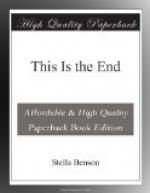Mr. Russell arrived in Christina the motor car, and simultaneously a shower fell. From the first moment Jay felt unsuccess in the air of that much-anticipated day. She was introduced to Christina, and said, “But we can’t take that thing into the Cathedral.”
“We don’t want to,” said Mr. Russell, although, as he was a born driver, the challenge made him instinctively measure with his eye the depth of the steps, and the width of the doorway, from Christina’s point of view. “We don’t want to pray. We want to talk.”
Anonyma would have been astonished to hear him say this.
“As a matter of fact,” said Jay, “I brought Chloris for the same reason.”
Chloris was eating the bread which a kind but short-sighted old lady believed herself to be giving to the pigeons.
Mr. Russell had hardly been able to imagine his ’bus-conductor in any dress but that of her calling. Now that he saw her in unambitious London-coloured things, he was glad to notice that her clothes were not Sunday clothes, but the sort that you forget about directly you look away from them.
This was the sort of day that breaks up delusions, and as Christina the motor car started away, Jay discovered that her hat was not adequately attached to her head. There are few discoveries more depressing than this at the beginning of a day of movement.
The bells of St. Paul’s began to sing. Little fairy bells dodged behind and about the great notes. But Christina soon swept the sound into the forgotten air behind her.
“I’ve got a lot to talk to you about,” said Mr. Russell as he headed Christina Hackney-way. He was conscious that he was taking his miracle curiously for granted. I don’t think he really believed in it yet. For Mr. Russell all truth was haunted by the ghost of a clanking lie. He discerned deceit on the part of Providence where no deceit was. “I’ll give you your brother’s message first, because it interests me personally least. He is gone. There was a sudden move across the Channel last week, and he went—I suppose—ten days ago now. The message he hadn’t time to give you was an appeal to give up ’bus-conducting. He had an absurd idea that you walked out with men-conductors in Victoria Park.”
“Not at all absurd,” said Jay. “Not half so absurd as the idea of driving out with a casual fare. I know some delightful conductors and drivers; we joke together when the traffic sticks. There is one perfect darling called Edward; his only fault is that he drives a mere Steamer. But we always bow, and once when a horse fell down and we got hung up for twenty minutes in the Strand, he sang me a little song about a star.”
Mr. Russell listened to all this very attentively, and then continued: “Your brother wants you to go back to your Family. His last words to me about it were that if you could manage to be ladylike for three years or the duration of War, at the end of that time he and you would go and live by your two selves in New Zealand, and if you liked you need wear no skirts at all there, but riding breeches all the time.”




